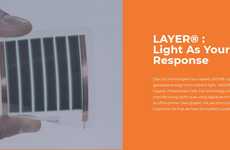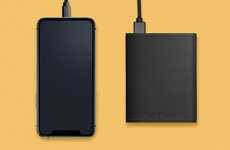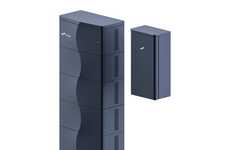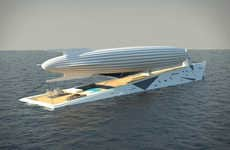
Low-Tech Magazine's Energy-Reducing Site Goes Offline When It's Cloudy
Laura McQuarrie — October 9, 2018 — Eco
References: solar.lowtechmagazine & fastcompany
There are countless solar-powered products that consumers have been introduced to over the years and Low-Tech Magazine recently introduced a new website that is powered by the sun—as such, it is noted that the website does go offline from time to time when it is cloudy.
Low-Tech Magazine describes that the "new blog is designed to radically reduce the energy use associated with accessing our content." The solar-powered site is housed on a single, self-hosted server and powered by a photovoltaic array on a balcony in Barcelona that belongs to founder Kris De Decker. When reading an article on the site, a reader is able to see how much battery life remains on the server, along with an icon to represent the weather.
The simple site, without ads and pop-up windows, is structured in a way that challenges web users to consider the energy that they consume with their online interactions.
Low-Tech Magazine describes that the "new blog is designed to radically reduce the energy use associated with accessing our content." The solar-powered site is housed on a single, self-hosted server and powered by a photovoltaic array on a balcony in Barcelona that belongs to founder Kris De Decker. When reading an article on the site, a reader is able to see how much battery life remains on the server, along with an icon to represent the weather.
The simple site, without ads and pop-up windows, is structured in a way that challenges web users to consider the energy that they consume with their online interactions.
Trend Themes
1. Solar-powered Websites - Creating websites powered by solar energy presents disruptive innovation opportunities for reducing environmental impact and promoting sustainable practices online.
2. Energy-reducing Technology - Developing low-energy technology for websites and online platforms can lead to disruptive innovation in the digital space, promoting energy efficiency and reducing carbon footprint.
3. User Awareness of Energy Consumption - Raising awareness among web users about the energy consumption associated with their online activities can drive disruptive innovation in creating more energy-conscious browsing experiences.
Industry Implications
1. Renewable Energy - The renewable energy industry can capitalize on the trend of solar-powered websites by providing more efficient and affordable solar energy solutions for powering online platforms.
2. Web Development - The web development industry can embrace energy-reducing technologies and practices to create websites that minimize energy consumption and contribute to a sustainable digital ecosystem.
3. Environmental Education - The environmental education industry can leverage the trend of user awareness of energy consumption to develop educational materials and campaigns that promote energy-conscious online behavior.
4.1
Score
Popularity
Activity
Freshness























